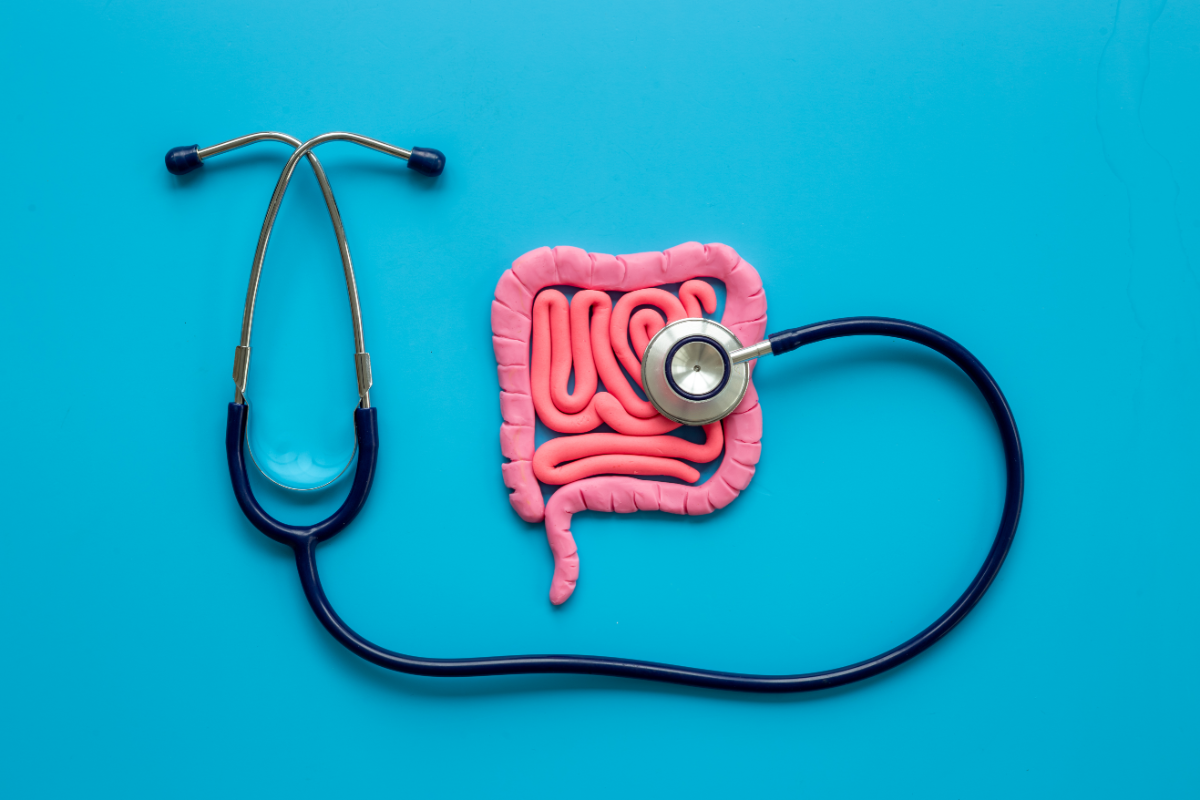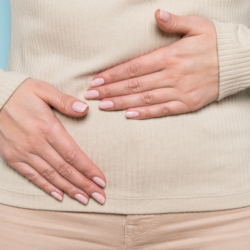Bloating is the swelling of the stomach caused by the accumulation of gas in the intestine or stomach. This gas comes mainly from the fermentation of certain foods (starchy foods, pulses, etc.) but also from air swallowed when eating or chewing gum. It can also come from gas trapped in certain foods that is released in the stomach. This intestinal gas can be evacuated involuntarily by burping or flatulence. Bloating is uncomfortable and can last for several hours after a meal. Generally, it is harmless. If it occurs frequently, it may be a sign of irritable bowel syndrome.
Treat intestinal bloating with phytotherapy
Herbal medicine is often used to treat bloating. Herbal teas of mint, aniseed or fennel at the end of meals are recommended to aid digestion.
Fennel is highly effective in combating digestive problems. It is best taken between meals:
- as seeds: 1 to 2 g of fennel, 3 times a day;
- as an infusion: 1 to 3 g dried seeds infused in boiling water for 5 to 10 minutes, 3 times a day;
- as a tincture: 5 to 15 ml 3 times a day;
- as an essential oil: 0.1 to 0.6 ml a day.
- as a dietary supplement: Arkogélules au fenouil: 1 capsule before meals in a large glass of water.
Mint tea is one of the most popular natural remedies, probably because it works so well for intestinal bloating and tastes so good.Bio Digestion infusion from the Iphym laboratory , for example, is a product we recommend for effective, natural treatment of digestive problems.
Charcoal (or activated charcoal) is also a highly effective remedy for gas and bloating before meals. Carbogaz capsules with vegetable charcoal, for example, are a complex of natural active ingredients to combat bloating.
How can gas and bloating be treated with homeopathy?
Homeopathy also offers solutions for bloating. There are several homeopathic remedies that can help relieve intestinal gas:
- Carbo vegetabilis: This remedy is often used for people who experience flatulence and bloating accompanied by abdominal pain. Carbo Vegetalis 5CH, or vegetable charcoal, gives good results with 3 homeopathic granules 30 minutes to 1 hour before a meal.
- Nux vomica: This remedy is effective for people who have digestive problems after eating fatty or spicy foods. Nux Vomica or vomiting walnut is recommended for abdominal pain associated with bloating, taking 5 granules 2 to 3 times a day.
- Colocynthis: This remedy is useful for people with intense abdominal pain and cramps accompanied by gas.
- Pulsatilla: This remedy is often used for people who experience bloating and flatulence accompanied by mood swings.
- Lycopodium: This remedy is effective for people who have digestive problems after eating foods rich in starch or sugar.
- China Rubra 9H is recommended for bloated, tense stomachs, taking 5 granules 2 or 3 times a day.
It is important to note that homeopathy should not be used as a substitute for traditional medical care. It is important to consult a doctor or qualified homeopath before starting any homeopathic treatment.
Massage your stomach with essential oils
To reduce intestinal gas and bloating, abdominal massage with essential oils can be a natural and effective approach. Here’s how to maximise the benefits of this technique.
Preparing the essential oil blend
Start by preparing your blend. Use a base oil such as sweet almond oil or apricot kernel oil, which are renowned for their gentleness and skin compatibility. Add a few drops of specific essential oils to relieve digestive problems. Peppermint,green aniseed, caraway and Roman chamomile oils are particularly recommended for their antispasmodic and calming properties. Peppermint aids digestion and relieves intestinal spasms, green anise helps reduce the formation of gas, and Roman chamomile soothes inflammation of the digestive tract.
Massage technique
To perform the massage:
- Position: Sit or lie comfortably on your back in a calm, relaxing environment.
- Application: Apply the oil mixture to your abdomen. Start the massage at the top of the abdomen, using gentle, even circular movements. It is advisable to work in a clockwise direction, which corresponds to the direction of intestinal transit, to help evacuate gas.
- Breathing: During the massage, concentrate on your breathing. Practise deep, regular breathing, which also helps to relax the abdominal muscles and promote better digestion.
Massage frequency
For best results, we recommend repeating this massage every night before bed. This routine can help regulate the digestive system naturally and prevent episodes of night-time bloating.
Precautions and recommendations
As essential oils are highly concentrated, it is crucial to dilute them correctly to avoid any risk of skin irritation. Follow the recommended dosage, generally a few drops of essential oil for a larger quantity of vegetable oil. In addition, before starting any treatment with essential oils, especially if you have a particular medical condition, are pregnant or breast-feeding, a consultation with a doctor or qualified aromatherapist is strongly advised to ensure the safety and effectiveness of the treatment.
By following these instructions, you can use essential oils to effectively reduce gas and bloating naturally, while promoting overall digestive well-being.
Choosing food supplements with lactic ferments
Probiotics are supplements that use bacteria strains found in the human intestine, while prebiotics are foods that nourish the intestinal flora to keep it healthy.
Probiotics play a crucial role in managing digestive disorders, particularly intestinal gas and bloating. They are often described as ‘ beneficial bacteria ‘ that reside naturally in the gastrointestinal tract. When this intestinal flora becomes unbalanced, whether through antibiotics, an unbalanced diet or illness, symptoms such as gas and bloating can intensify.
Sources of probiotics
Probiotics are available in a variety of forms, including supplements and fermented foods. Among food sources, yoghurt, kefir, sauerkraut, kimchi and miso are particularly rich in these living micro-organisms. Each of these foods provides a different strain of beneficial bacteria, which can contribute to a healthy diversity of intestinal flora.
Probiotics must be of very high quality. They should be tried out personally for at least a few days, as everyone has a unique composition of bacteria in their intestine. A probiotic may be just right for one person, but harmful for another, who may experience more bloating and perhaps suffer from mild diarrhoea. Prebiotics should be taken regularly, but in moderation, to avoid over-stimulating bacterial proliferation.
Benefits of probiotics for gas and bloating
Introducing probiotics into the diet or through supplementation can help to rebalance the intestinal flora. This rebalancing is crucial, as it can not only reduce gas production, but also improve overall digestion and nutrient absorption. Probiotics work by strengthening the intestinal barrier, fighting harmful bacteria and producing substances that nourish intestinal cells.
Mechanisms of action of probiotics
Probiotics work by several mechanisms:
- Competition with pathogens: probiotics can inhibit the growth of harmful bacteria competing for nutrients and adhesion sites in the intestine.
- Production of antibacterial compounds: some probiotic strains produce substances that inhibit pathogens.
- Modulation of the immune system: probiotics can modulate the host’s immune response, reducing the inflammation that can contribute to symptoms of bloating.
There are several ways to avoid intestinal gas and bloating when using probiotics:
- Start with a low dose and gradually increase: If you’ve never taken probiotics before, it’s best to start with a low dose to avoid side effects such as gas and bloating.
- Choose probiotics that are well tolerated: Some types of probiotics are better tolerated than others. For example, probiotics based on bifidobacteria or lactobacilli are generally well tolerated.
- Combine probiotics with a balanced diet: A diet rich in fibre and fermented foods can help reduce the side effects associated with probiotics.
- Keep sufficiently hydrated: Drinking enough water can help prevent bloating and gas.
- Consult a healthcare professional: If you have underlying health problems, it’s important to consult a healthcare professional before taking probiotics.
It’s important to note that the side effects associated with probiotics are generally temporary and disappear after a few days. If side effects persist, it is best to consult a healthcare professional.
Hydration and its role in bloating
Hydration plays a crucial role in maintaining digestive health and can be particularly beneficial in preventing and treating intestinal gas and bloating. Adequate hydration helps the digestive system function properly and helps avoid the discomforts associated with poor digestion.
Water
Water is essential for the digestive process. It helps to dissolve nutrients so that they can be absorbed efficiently by the intestine. Water also plays a role in maintaining stool consistency, thus preventing constipation, which is often a cause of bloating. It is recommended that you drink at least 1.5 to 2 litres of water a day, adjusting this amount according to your physical activity, the temperature outside and your general state of health.
Herbal teas
Herbal teas are another beneficial option for maintaining good hydration while taking advantage of the specific properties of certain plants that aid digestion and reduce gas. For example:
- Peppermint herbal tea: This is renowned for its antispasmodic and relaxing effects on the muscles of the intestine, which can help reduce bloating and abdominal pain.
- Fennel tea: Traditionally used for its carminative properties, it helps expel gas and relieve bloating.
- Chamomile tea: Known for its calming effects, it can also help relax the gastrointestinal tract and relieve digestive symptoms such as gas and bloating.
To make herbal teas part of your daily routine, drink one or two cups after meals to optimise digestion. This not only increases fluid intake, but also allows you to benefit from the therapeutic properties of the herbs.
General recommendations
It’s important to drink regularly throughout the day, not just when you feel thirsty, as thirst is a late sign of dehydration. For those who find it difficult to drink enough water, adding slices of fresh fruit or mint leaves can make the water more appealing.
For more information, do not hesitate to ask your doctor for advice.





